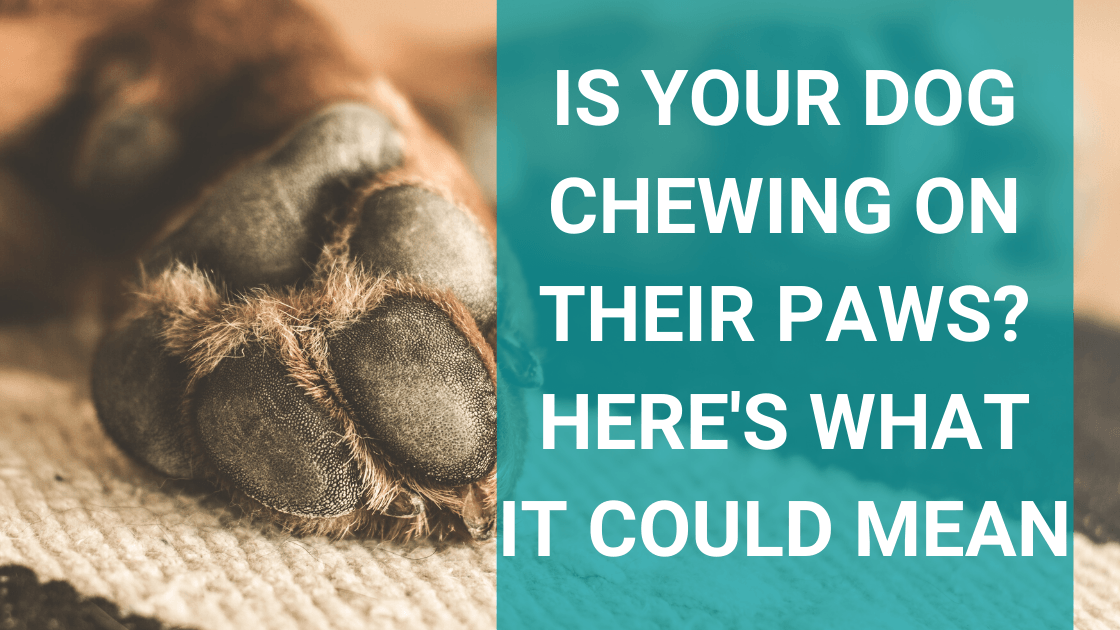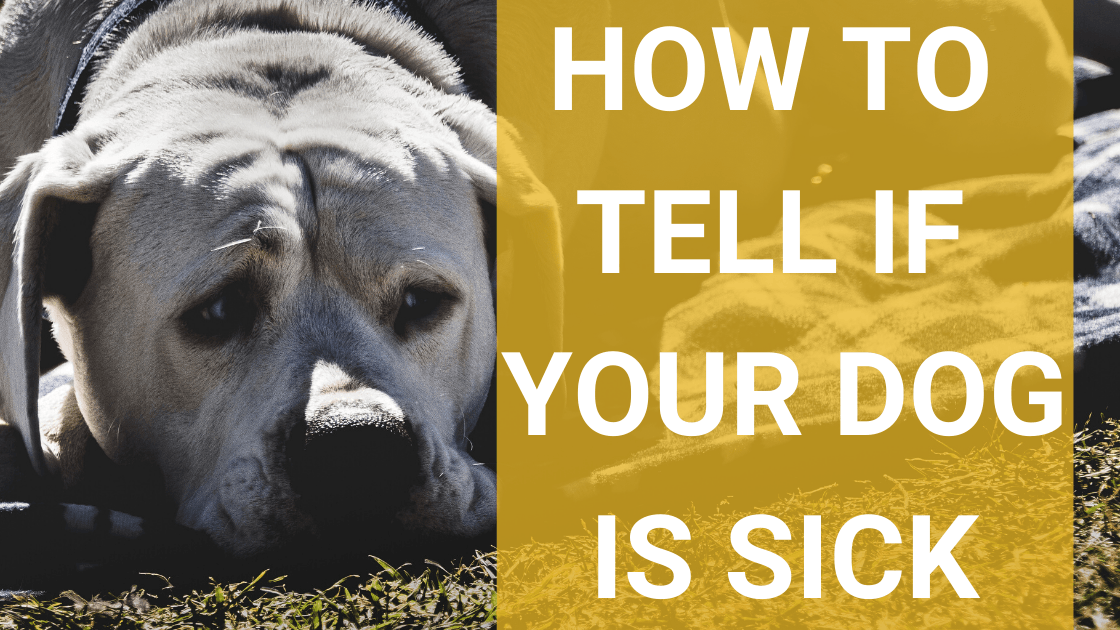There’s no doubt that your dog can exhibit a variety of strange behaviors. Some of them laughable, like when Fido sleeps belly up on the couch, and others that have you scratching your head a bit. We all know our dogs can’t tell us when something’s wrong, but their behaviors often give us a clue.
If you’re here, I know you’re wondering about your dog chewing on their paws. What’s up with this strange, sometimes obsessive behavior? Are they bored, is it an allergy, a mite? Whatever the case may be, their poor paws are getting more and more irritated!
If your dog is chewing on their paws, five common reasons are:
- Pain or injury
- Allergies
- Parasites
- Mental health issues
- Dry skin
Dogs chewing their paws is a very common dog behavior. But getting to the root cause isn’t always as obvious. Today we’re going to unpack the most common causes and find out what you can do to help Fido break the habit and get more comfortable.
Pain or injury causing your dog to chew their paws
If you notice your dog chewing or licking their paws excessively, and this isn’t normal behavior, your first step should be a complete evaluation of their entire paw, paw pad, foot, and leg. Often, dogs will lick or chew at an area that is causing discomfort or pain.
If your dog’s paw chewing is caused by an injury, you’ll be able to address the problem, help them heal, and the behavior should diminish. Here are some common injuries that could be causing licking and chewing of the paws:
- Split or very long nail causing discomfort (read about trimming your dog’s nails)
- A laceration, splinter or painful cracking of your dog’s paw pad
- Foot joint pain due to arthritis
- Ice between the toes after being out on cold days
- A fractured toe
If you can’t see a clear injury, but your dog yelps in pain, pulls their paw away, or they aren’t putting weight on the paw that they are licking, a trip to the vet is a good idea.
Related Reading: Dog First Aid Tips
Dog chewing paws due to allergies
One reason your dog may be licking and chewing their paws is allergies. When dogs lick and chew their feet, it’s often a response to general or localized itchiness. For dogs, this is a common symptom of allergies.
Your dog’s allergies usually fall into one of two categories: seasonal/environmental or food-related. Allergies can be tricky to diagnose and treat in dogs because figuring out the cause isn’t easy. To complicate matters itchy paws are a symptom of both types of allergies.
Seasonal allergies and dog chewing paws
If seasonal allergies are causing your dog’s itchy paws, the condition usually presents between six months and three years of age. The biggest concerns with your dog chewing their paws are their general discomfort, compromised immune system, and the development of secondary infections.
There aren’t that many allergy pills available for dogs (you know, like Claritin for humans), many on the market actually exacerbate the problem or further compromise your dog’s immune system making the condition worse when the medication is stopped.
Because it can be hard to determine and then eliminate seasonal allergy triggers, your vet will likely recommend symptom management during a flare-up of itchy paws.
This is usually in the form of Benadryl or antihistamines, a cone to prevent access, steroids for very extreme itching, antibiotics to treat secondary infections caused by the chewing.
Food allergies and dog chewing paws
If a food allergy is causing your dog to chew their paws, you may see other symptoms along with the chewing like recurrent ear infections, vomiting, diarrhea, and extreme hair loss. Though this isn’t always the case.
If you suspect a food allergy is causing your dog’s itchy paws, you’ll want to switch them to an elimination diet by using a limited ingredient dog food. It can take up to three months for symptoms to improve so you’ll be in this for the long-haul.
The most common food allergens for dogs are chicken, beef, eggs, wheat, corn, and soy. So a great place to start is with a limited ingredient food that has a more diverse protein source (think bison or venison).
Parasites or mites causing paw chewing
If you see your dog licking or chewing their paws, it could be parasite related. For mites and fleas, you’ll probably see chewing and itching on the paws and other parts of the body. However, ticks can also cause an itching sensation and if one attaches on or between the toes, your dog may chew at it to try and remove the little bug.
If fleas are causing your dog’s itching, you will probably be able to see these pesky little insects running along your dog’s skin when you pull their fur apart. Flea and tick collars or oral flea and tick medications will help wipe them out, but while the medication is at work vigilantly cleaning your home and washing all bedding is a must.
Mites can be harder to diagnose because they aren’t visible to the human eye. If you suspect mites, your vet can do a skin scraping to diagnose and suggest proper treatment.
Dog chewing paws may indicate mental health issues
Paw chewing and licking aren’t always caused by external stimuli and instead may be an indicator or a psychological issue. In fact, this type of obsessive behavior is very prevalent in a number of dog mental health issues.
If you are seeing your dog chewing on their paws could they be:
- Suffering from separation anxiety? Sometimes separation anxiety can come on suddenly in older dogs or when there are significant changes to your schedule
- Experiencing depression? This can be brought on by the death of a family member or pack member, sudden change in schedule, new addition to the family
- Experiencing boredom? Dogs, especially working breeds, need adequate mental and physical stimulation. If their exercise and brain needs are being met, obsessive behaviors like paw chewing can begin.
Dry skin on the paws leading to chewing and licking
Sometimes dogs chewing their paws is the result of dry skin. This is more common in winter months and areas with dry climates all year round. Other causes of dry, itchy skin on dogs are nutritional deficiencies and thyroid disorders.
If this is the case, you may notice flaky, dry skin on other areas of your dog’s body, too. You also may notice a generally dull-looking coat.
If you think dry skin is causing your dog’s itchy paws, addressing their overall skin and coat health can help. Here are some things you can do:
- Add healthy fats to their meals or diet. This can be in the form of coconut oil, avocado oil, olive oil, or fish oil supplements
- Use a gentle oatmeal bath once per month
- Talk to your vet about using a balm or moisturizer between their toes to address dry skin. Straight up coconut oil can work too but may lead to more licking (due to the delicious taste ;) )
Get to the root cause of your dog chewing on their paws
Here we’ve discussed the five most common reasons dog chew on their paws. Hopefully, with a little bit of detective work, you can address the problem! Whether that’s getting rid of the discomfort or helping them overcome a psychological challenge.
Is your dog experiencing itchy paws? What do you think might be going on? We’d love to hear your story below!



